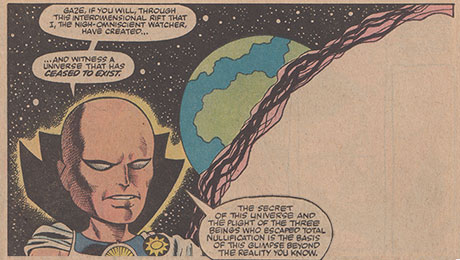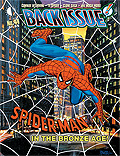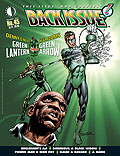
Doug: One could debate who said "With great power comes great responsibility.", but if you put your money on Stan "the Man" Lee, you'd probably lose. Osvaldo Oyola and I had a brief encounter on Twitter yesterday and he said he's had a question to throw out to our intrepid group of commenters, but as this isn't a forum he wondered how he'd do it without hijacking a thread. Well, brother -- how about this Open Forum? Here's his question/posit/request:
It is more like research than topics - I am thinking through Spidey's old adage of "With Great Power Comes Great Responsibility" and trying to re-interpret it when it struck me that Spider-Man has been often depicted as making impulsive decisions - I am thinking of times he starts fights without finding out what the context is, misjudging people, or making matters worse - but while I have the impression, I don't have many examples I can draw. I have the complete Amazing Spider-Man run on CD-ROM - but short of going through the whole thing, it will be difficult to find those instances/stories. So basically, I was wondering if BAB readers might be able to think of examples, even if they don't know issue numbers (I can Google for those), or if they want to, we can argue this is not a frequent depiction.
My running thesis is that Spider-Man has a recurring structure of action>failure>retreat>reflection>action.
What do you think?
- Osvaldo
Doug: So there you have it. I think we can get a nice conversation going this weekend with this topic. We'd also invite those of you who will see
Dawn of the Planet of the Apes to
post some spoiler-free comments after you see one of this summer's most anticipated films. Looking forward to hearing from everyone!
 Doug: One could debate who said "With great power comes great responsibility.", but if you put your money on Stan "the Man" Lee, you'd probably lose. Osvaldo Oyola and I had a brief encounter on Twitter yesterday and he said he's had a question to throw out to our intrepid group of commenters, but as this isn't a forum he wondered how he'd do it without hijacking a thread. Well, brother -- how about this Open Forum? Here's his question/posit/request:
Doug: One could debate who said "With great power comes great responsibility.", but if you put your money on Stan "the Man" Lee, you'd probably lose. Osvaldo Oyola and I had a brief encounter on Twitter yesterday and he said he's had a question to throw out to our intrepid group of commenters, but as this isn't a forum he wondered how he'd do it without hijacking a thread. Well, brother -- how about this Open Forum? Here's his question/posit/request:


















































18 comments:
I could think of a few examples, such as when he met the new Captain Marvel and mishandled the situation--but perhaps that's missing the point. The nature of responsibility is that we try our best to be responsible, yet we're not always going to succeed. Peter Parker did an about-face in terms of responsibility, when his uncle was murdered due to his selfishness and inaction--but that doesn't make him infallible. I imagine swinging around the city from a high altitude is going to make him prone to misinterpreting all sorts of crises unfolding beneath him, while making split-second decisions as to how to handle them. Marvel's stable is full of heroes who at times blunder in and make the wrong call--but responsibility comes into play when, instead of shrugging and taking a live-and-learn attitude, they try to make things right. That's something that I think the character of Spider-Man excels at.
First of all, Doug thanks so much for indulging my question!
Comicsfan, I would still love any examples you can give.
I think you are right, that attempting to do the right thing is an important element to responsibility. I am not suggesting that he need to be infallible, but isn't is also "responsible" to try make sure the action we DO take are measured and reasonable? Sure, that is not always possible - but I was thinking of that possible pattern in Spider-Man stories and what it might mean.
I think an interesting dichotomy in Spider-Man's quest for using his powers responsibly would be the times he's used kid gloves against the Lizard or the Harry Osborn Green Goblin set against those instances where Peter has been under extreme stress and has nearly killed street punks. I'm sorry to not have issue numbers, Osvaldo, but on more than one occasion in Marvel Team-Up or the various Bronze Age Spider-titles I can recall both types of situations.
So as a periphery to the general question(s) raised, is "responsibility" open to the discretion of the author du jour, or is it inherent to Peter Parker's character. That is, do "responsibility" and "justice" equate? Does a street punk deserve to be throttled, but a mentally-ill super-villain deserve pity and rehabilitation? And what of the various methods of "restraint" employed by Spider-Man? A pummeling, vs. say, a web cocoon.
Doug
Edo, before I even click that link-- is this going to be that "Spidey Intellectual Stories" skit? Ohhh-ho-ho-ho-hooooo! One of my FAVORITES!
HB
(The Mad Thinker's little surrender line long ago became a personal meme for me whenever one of my crew convinces me to change course on how to build or assemble something. . . )
Indeed it is, HB. A little masterpiece by none other than Roger Stern.
Spidey does seem to have a knack for jumping into a fight first and thinking afterwards. A couple examples off the top of my head: there was an early issue of Amazing where he saw some guys in costumes running down the street and jumped them, then found out they were shooting a scene from a movie.
Another one (which is from 1990, so technically not Bronze Age, but illustrative of what we're talking about) is in Web of Spider-Man #62, when Liz thinks Molten Man is trying to extort money from her and Peter offers to talk to him, then changes his mind (for no reason) and starts a fight, trashing Liz and Harry's apartment; turned out Moltey was just looking for a loan so he could get back on his feet.
Mike W.
I don't know if it was existentially scripted, but the basic formula for Spider-Man appeared to be that for every good thing that happened to him, two bad things would also happen. Every moment of confidence and joy was acutely paired with horrible consequences and repercussions.
Certainly kept you turning the pages.
Acting impulsively and acting irresponsibly are really two different things.
So, Spider-Man/Peter jumping feet first into a situation before he has all the facts, such as mistakenly getting in a throw down with a fellow superhero, would be an example of impulsive behavior. Which he has engaged in many times. (Mostly in Marvel Team-Up) and usually just so the writer would have an easy excuse for Spider-Man and "other superhero" to duke it out for the fans for a few pages.
Acting irresponsibly would be if he purposely didn't act to stop an injustice, or to help an innocent person, because he didn't feel like it (or some other such reason). And I don't think I can ever recall Spidey knowingly not trying to help someone for any reason. (At least since the burglar situation anyway).
In fact, it's usually quite the opposite. Peter goes out of his way to do all that he can to help anyone and everyone, even if he is injured or sick or otherwise hindered in some way. Even at great detriment to himself, and his personal life. He even assumes responsibility for things that aren't his fault at all (like the creation of certain super villains, etc.). To the point where if I could crawl inside a comic book I'd say, "Dude, you can't solve all the world's problems just because you have spider powers!! Give yourself a break already!"
So, I'd have to say that Peter/Spidey actually does a pretty good job of living up to his famous moral code: "With great power, comes great responsibility."
Yeah, I think William sums it up pretty well: I've been trying to think of instances of Spidey actually behaving irresponsibly (as opposed to impulsively) and drawing a blank.
Happened long, long after I stopped reading (and now you know why I stopped reading)....
http://goodcomics.comicbookresources.com/2011/04/15/that-time-peter-parker-struck-his-pregnant-wife/
Gah.
Yes Pat, but even that was borderline impulsive, as Peter didn't really mean to do it, as his reaction immediately afterwards illustrates.
Also, at the time, Marvel was seriously intending for that Peter to actually be the clone, and Ben to be the real Peter. So, they probably figured it wouldn't matter, since it wasn't the "real" Peter that struck MJ, just his crazy clone.
Thenof course Marvel backed off that idea, and Peter was really Peter after all. (That sounded weird). So, after that they never mentioned the incident again, and hoped everyone would just forget (or ignore) the fact that they had the most upstanding guy in the Marvel U bitch slap his pregnant wife.
So nothing about the pattern I noted?
I am thinking of something like when he fights the Vulture, realizes he is going to have a hard time defeating a guy who can fly and retreats to think thru the problem and comes up with a device to counteract Vulture's flying device.
Or creating a special gloves(?) to deal with Electro. . .
Even just examples of his accidentally attacking a fellow superhero would be great. Thanks.
Another possibly helpful topic:
Do you folks know examples in comics where characters are aged from childhood into adulthood and/or vice versa?
Ilyana Rasputin, of course. Didn't this happen to Franklin Richards at some point?
What about characters who started as young people but were aged disproportionately with other characters? Like Kitty Pryde
So Osvaldo, I went back to your original question ('cause I wasn't coming up w/ truly specific examples, even though your description of that pattern certainly rang true), and I think maybe your premise isn't a perfect fit. Or rather that it does fit Spidey. . . but it also fits many, many other heroes and characters throughout hero-based fiction in general. It certainly fits the formula for Harry Dresden's exploits. Most straightforward detective shows have long followed this pattern. Ha! I can cite me ol' pal Kolchak the Night Stalker again!
INVINCIBLE (from Image Comics) traded on this formula in a fashion that was very much early-
Spidey-on-Cocaine-laced-Steroids. The old Henry Reed series of kids books. I think the thing with Spidey is that it always tended to resonate more with us fans 'cause we were always so much more invested with Peter personally. . . and because for so long his Everyman status was reflected so effectively in the types of struggles he had and problems he had to overcome. (ALWAYS with the rent; ALWAYS with the bills; ALWAYS with the worryin' about poor Aunt May's health; ALWAYS with the "main" job/"second" job/school/personal life balance.) But I don't necessarily think that the structure itself that you've correctly identified is specific to Spidey-- it just suits him really, really well. Does that make sense?
Man, Franklin Richards' age is kind of a train wreck, AS IS his sister Valeria's, now. He did once get "accelerated" for a while into being a teenager (so they could foist the ill-fated FANTASTIC FORCE upon us), and then he got changed back to being a little kid. And he's been an adult. And Valeria's been a)stillborn, b) a pre-teen older sister, and c) a younger little sister of maybe 3 or 4 years old.
Yeesh.
HB
Not so much an example of Spidey acting impulsively but rather a case of mistaken identity - the issues where he meets Nightcrawer and the Punisher.
I just read a reprint of Amazing Spider-man #3, the very first appearance of Doc Ock. In this, Peter is not so much impulsive as overconfident. Here, he's really cocky and thinking his spider powers will help him defeat any bad guys easily. Doc Ock easily overpowers him and throws him out of a building; Spidey gets his first lesson in humility!
It seems from reading Bronze Age issues that Spidey's main problem wasn't impulsiveness but rather underestimating his foes. Whether he was fighting Doc Ock, the Rhino, Vulture, Kraven or the Lizard, he invariably found out the hard way that he couldn't overpower these guys, so he had to use his greatest weapon, i.e. his guile and resourcefulness to defeat them. Off the top of my head, he devised a formula to stick Ock's arms together and then another formula to melt the Rhino's hide off.
As for changing character ages, didn't Magneto get zapped into infanthood once?
- 'Methodical' Mike from Trinidad & Tobago.
Does Spider-Man start fights without finding out what the context is, misjudging people, or making matters worse? Yes, as does just about every Marvel superhero. Otherwise, how would we get all of those superhero versus superhero battles?
I do vaguely remember, in one of the very first issues of the Amazing Spider-Man (#8?) where he basically picked a fight with the Human Torch, as Johnny was at a party full of innocent bystanders, no less, just to show how cool he was. He didn't come off too well in ASM #1 with the Fantastic Four, and he acted like a jerk in several other early instances.
I'm afraid I am not getting a handle on your original query, Doc. It sounds to me like standard Superhero Plot A-1. Hero meets new villain or old foe with a new wrinkle. Standard powers-solution fail. Hero regroups and tries again, emerging victorious.
Your Aging Question is more unique. As mentioned, Franklin Richards is an inane mess. Is there some in-story explanation why he's locked at about 8 years old forever?
Mike is correct. The ultra-mutant Alpha rebelled against his creator, Magneto, and reverted the entire Brotherhood of Evil Mutants to babyhood. I recall this because it was the key to my only printed letter in a comic book. The new line-up of X-Men was sparkling new. Why not, I proposed, add in their former foes? Give the young, new mutants a new lease on life? And, the next issue with no explanation, a spy for the Shi'ar waved his hand reverted them all back to adulthood, memories and personalities intact. I still think my idea would have been better.
Kitty Pryde has been aging at a glacial pace, but aging. Cassie Lang went from about 8 years old at first introduction to a teen hero member of the "Young Avengers".
I'll have to think some more. Gotta dash for to a movin' picture. (nothing to do with apes)
I have to not just agree with William, but strongly agree with William. Peter's acceptance of his role as hero is the basis of "with great power comes great responsibility". Putting on the mask and swinging out the window is his choice to use his powers to benefit all mankind. The impact this has made on his relationship with Gwen Stacy, his studies, his family life, heck the strain his dual life has put on Aunt May is well documented. The times he's come home to a dark apartment because the power was turned off, missed school work because he was off fighting bad guys, falling asleep in class. Yet he still continues as Spider-Man. He has a responsibility to fight for those who can't fight for themselves.
When I think of Spidey acting impulsively, I always go back to his downing the experimental formula that mutated him into an 6 armed 2 legged Spider-Man. 100 through 102 IIRC.
The Prowler (finally back in my own bed).
Post a Comment